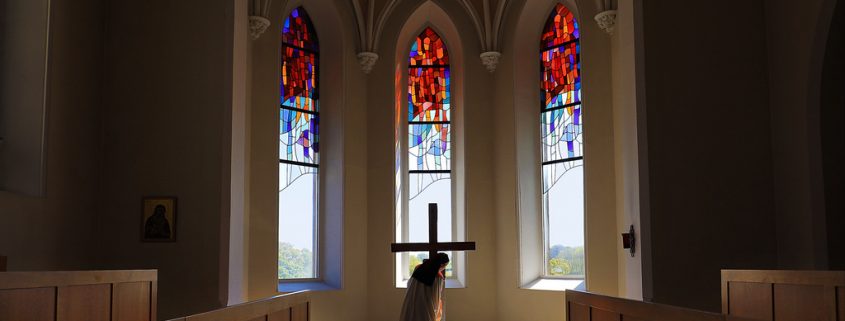How Can We Say That God Is Good?
How can evil and God co-exist in our world? What meaning does suffering have in our lives? As we commemorate Jesus’ death on a cross on Good Friday each year, we are called to enter more deeply into the mysteries of our faith. Theologian Gerard W. Hughes reflects on these questions.
How can we say that God is good when we look at the horrors of human life? Natural disasters, droughts, hurricanes, the animal world preying on one another, the inbuilt destructive viruses bringing disease and death, are bad enough, but human minds and hearts are the most destructive force in nature, capable of destroying all life on our planet. Can we be honest with ourselves and still say; ‘God is good’?
Reason, philosophies and theologies of the problem of evil can only nibble at its surface. The mystery of Christ’s passion and death upsets all our theories. If God is ‘the supreme Spirit who alone exists of himself and is infinite in all perfections’, ‘the First Mover’, ‘the Uncaused Cause’, then is he not ultimately responsible for the existence of evil?
Jesus reveals a most surprising God: ‘God’s foolishness is wiser than human wisdom, and God’s weakness is stronger than human strength’ (1 Corinthians 1:25). God, in Jesus, refuses to exercise power as we understand it, identifies himself with every human being, ‘emptied himself to assume the condition of a slave’ (Philippians 2:6), a powerless, vulnerable, silent and hidden God, who enters into the pain, weakness, sinfulness and corruption of human life. God, in Jesus, absorbs in himself the concentrated and venomous onslaught of sin, and transforms it. On the cross he prays, ‘Father, forgive them; they do not know what they are doing’ (Luke 23:34). John expresses the transformation with, ‘When they came to Jesus they found he was already dead, and so instead of breaking his legs, one of the soldiers pierced his side with a lance; and immediately there came out blood and water’ (John 19:33-34).
If Jesus has suffered for us, why do we still have to suffer the effects of our own and other people’s sinfulness? Because if we are to be healed, and if we are to be at one with God in his work of transformation, we have to enter, with him, the pain of things. It is in our woundedness, not in our power, that we find him. He is a God who weeps in our hearts, but his tears are healing tears, springs of everlasting life, cleansing, sustaining, transforming, giving us hope when everything seems hopeless and the inner assurance that in all our bewilderment, uncertainty, disillusionment, stupidity and ignorance, yet ‘All things will be well, all manner of things will be well’ (Julian of Norwich). In the tears of things, love is always there, invincible, indomitable, but hidden, apparently powerless, yet reconciling all that is in heaven and all that is on earth (Colossians 1:20).
Prayer
God in the sufferings and death of Christ, from whose side there came the blood and water, you are showing us your love. Open our eyes so that we can recognise your love and accept it in every moment of our lives. We ask this through Jesus Christ, our Lord. Amen.
– (Gerard W. Hughes ‘Oh God Why?’ A Spiritual Journey Towards Meaning, Wisdom and Strength’)
Photograph by Valerie O’Sullivan



